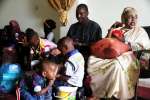UNHCR repatriates almost 14,000 Angolans; steps up pace of return ahead of deadline
News Stories, 8 June 2012
GENEVA, June 8 (UNHCR) – The UN refugee agency announced Friday it has repatriated almost 14,000 Angolan refugees since last November and is stepping up the pace of returns before refugee status ends for tens of thousands of Angolans at the end of this month.
UNHCR spokesman, Adrian Edwards, explained to journalists in Geneva that group refugee status will formally end on June 30 for people who fled Angola during the country's 1965-75 war of independence from Portugal and during the subsequent civil war, which ended in 2002.
"UNHCR launched a new assisted return programme in late 2011 to help Angolans return home from nearby countries, and we are now accelerating that programme," Edwards said. "As of June 2, some 13,700 Angolans had gone back with our help, including over 11,000 from Democratic Republic of the Congo [DRC]. Some 35,000 more have asked for help in getting back before refugee status ends."
The recommendation to end group refugee status for Angolans was made in January this year on the basis of fundamental improvements in the country situation. Many of the roughly 600,000 people who fled Angola to neighbouring countries have already returned home.
Edwards explained that since mid-May, UNHCR has doubled the size of repatriation convoys from the DRC for refugees returning to northern Angola. "Currently 1,200 people are being returned weekly. These refugees are travelling from the capital Kinshasa, as well as from nearby Kimpese in Bas-Congo province and Dilolo in Katanga province, in south-east Congo. They are heading to Uige province in northern Angola, where most of the refugees are originally from."
UNHCR has also ramped up efforts to promote voluntary repatriation of Angolans from other African countries. Namibia relaunched return convoys last month, with more than 3,000 Angolan refugees having registered to repatriate.
Meanwhile returns from Zambia are being done by chartered aircraft. In Botswana, a recent "go-and-see" visit was organized to return areas to help hesitant refugees make informed decisions about returning. "We are also working with governments to increase the number of road convoys and to use bigger planes to repatriate people, particularly for those returning from the DRC and Zambia," said the UNHCR spokesman
In Angola, the logistical challenges are substantial. In some areas, returns by land are extremely difficult due to poor road conditions and washed out bridges. "Our staff and those of our partners are working in difficult circumstances to ensure that convoys run smoothly and that people with specific needs, such as pregnant women, children and the sickly, reach home safely and in dignity," Edwards said.
Currently some 120,000 Angolans remain in exile, with the largest refugee populations in DRC (81,000) and in Zambia (23,000). UNHCR is working with host governments to consider local integration options for those refugees who do not choose to return, in particular those with strong ties to their country of asylum. Angolan refugees who don't want to return for fear of persecution can apply to the authorities for an exemption to the cessation clauses. If granted, those refugees will retain the refugee status.














































